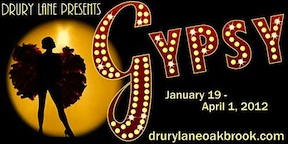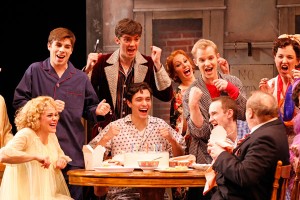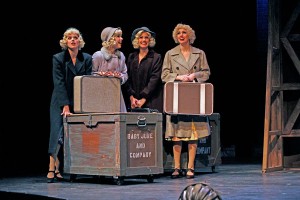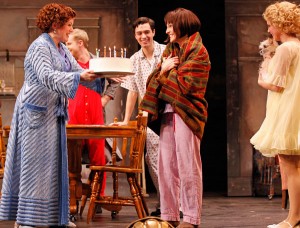KLEA BLACKHURST IS QUEEN OF THIS GYPSY
Gypsy is a musical theater biography of striptease performer Gypsy Rose Lee; but it’s really about Gypsy’s mother, Mama Rose, immortalized by Ethel Merman in the original 1959 production. Merman’s performance set the bar for all future performers brave enough to take on the role. Every revival of the show becomes a referendum on how the actress meets the Merman standard. The revival at the Drury Lane Theatre stars Klea Blackhurst as the indomitable and domineering Rose in a performance that holds up solidly in the Merman tradition. Blackhurst is the chief ornament in the production, but she’s complemented by a fine supporting cast, quality production values, and the brilliance of the show itself.
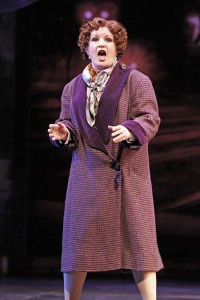 Blackhurst doesn’t quite have the powerhouse Merman voice (who does?), but she sings in the belting Merman manner, and even physically resembles the great lady. Blackhurst gives the fearsome Mama Rose a light touch in the early scenes, but she grows in dramatic weight as the bossy, domineering Rose ratchets up her stage mother ferocity. Blackhurst caps her star turn with a searing solo in the show finale, the epic “Rose’s Turn,” one of the great tour de forces in musical theater as the woman, abandoned by her daughter, has a singing nervous breakdown on stage.
Blackhurst doesn’t quite have the powerhouse Merman voice (who does?), but she sings in the belting Merman manner, and even physically resembles the great lady. Blackhurst gives the fearsome Mama Rose a light touch in the early scenes, but she grows in dramatic weight as the bossy, domineering Rose ratchets up her stage mother ferocity. Blackhurst caps her star turn with a searing solo in the show finale, the epic “Rose’s Turn,” one of the great tour de forces in musical theater as the woman, abandoned by her daughter, has a singing nervous breakdown on stage.
Inspired by the memoirs of Gypsy Rose Lee, the story (superb book by Arthur Laurents) traces how Mama Rose bullies and cajoles her daughters Louise and June through an endless series of two-bit vaudeville houses, relentlessly trying to make them stars. First in the Mama Rose spotlight was June, a child actress who finally escaped from her mother’s smothering clutches and eventually became film actress June Havoc. After June’s departure, Rose turned to the shy and less talented Louise, who by a twist of fate started on the lowest dregs of burlesque and become a celebrity in American show business and even something of an intellectual.
Rose is one of the great characters in American musical theater and also perhaps the most unsympathetic. Her obsession to see her daughters as show business stars thinly masks her own insecurities, her pathological need for control, and her inability to keep the affection of those who love her (she had three husbands and a prospective fourth walks out on her in Gypsy). The audience may see Rose as humorous and pathetic, but the woman surely must have been hell to be around. The audience might get some pleasure from a comfortable distance watching the tyrannical Rose rejected and humbled at the end of the show, notwithstanding the touchy-feely final moments.
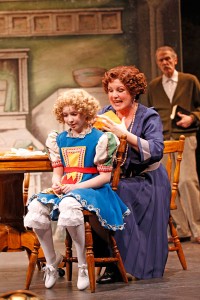 Jule Styne (music) and Stephen Sondheim (lyrics) created one of the great scores in music theater history. The songs contribute mightily to the narrative and character development, but they also hold up as stand-alone hits. Very few musicals have amassed a roll call of quality numbers like “Some People,” “Small World,” “You’ll Never Get Away from Me,” “Everything’s Coming Up Roses,” and “Together Wherever We Go.”
Jule Styne (music) and Stephen Sondheim (lyrics) created one of the great scores in music theater history. The songs contribute mightily to the narrative and character development, but they also hold up as stand-alone hits. Very few musicals have amassed a roll call of quality numbers like “Some People,” “Small World,” “You’ll Never Get Away from Me,” “Everything’s Coming Up Roses,” and “Together Wherever We Go.”
Drury Lane’s production employs more than 25 performers, several of them children who all perform like real troupers. Andrea Collier plays the adult June, who manages to break away from her mother’s emotional tentacles. She’s excellent, but Andrea Prestinario is even better as Louise because the role has greater acting opportunities. Prestinario deftly develops Louise from a diffident and intimidated young woman into the self-confident stripper who blossoms into Gypsy Rose Lee, a personality ahead of her time as a People Magazine heroine.
The only other role of importance is Herbie, the theatrical agent who for some reason loves Rose until he just can’˜t take the woman anymore. David Kortemeier gives a humane, low-keyed performance that contrasts neatly with Blackhurst’s relentless, brash Rose.
There are several production numbers but not much pure dancing. Most of the production numbers replicate the tacky, zero talent choreography of the second rate vaudeville houses of the 1920’s and early 1930’s. Choreographer Tammy Mader doesn’t stint on the silliness of those numbers, but when she gets a chance to choreograph some real dancing, she comes up big, notably with Matthew Crowle’s terrific tap dancing turn in “All I Need Is the Girl.” The “You Gotta Have a Gimmick” number ranks along with “Rose’s Turn” as the sure-fire musical moment of the evening. Three burlesque strippers demonstrate to the wide-eyed Louise how a gal needs a gimmick to set herself apart in the competitive world of burlesque. Props to Susan Lubeck, Cheryl Avery, and Frances Asher (who looked like a caricature from a William Hogarth cartoon) for capturing the hilarity of the number with commendable vulgarity.
The strong design team consists of Martin Andrew (scenery), Jesse Klug (lighting), Sarah Pickett (sound), and especially Melissa Torchia (costumes). Roberta Duchak and Ben Johnson supply the music direction. William Osetek directs with zest and a good sense of when the show should be funny and when it should be serious. But the night belongs to Klea Blackhurst, who nails her daunting, exhausting role. Merman would approve.
Gypsy
Drury Lane Theatre in Oakbrook Terrace
ends on April 1, 2012
for tickets, visit Drury Lane
for more shows, visit Theatre in Chicago
